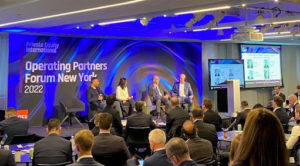The private equity deal market has been slow in 2023. There are signs, however, that that could change soon.
In fact, BluWave founder and CEO Sean Mooney believes PE is ready to “call a bottom” based on proprietary internal data. That means that firms must have their due diligence resources lined up ahead of the anticipated wave of deals this fall and beyond.
Mooney was recently joined by BluWave Head of Technology Houston Slatton and Hidden Harbor CP Partner Andrew Joy to discuss the intricacies of commercial due diligence on a live webinar.

Here are some of the top takeaways from their conversation:
Understanding Target Markets
The panel touched on how commercial due diligence is pivotal in assessing market conditions.
“The definition of commercial due diligence in my mind is a synthesis of all factors, both historically and in the future that affect the growth and the competitiveness of the target in that particular model,” Joy said.
This “synthesis” involves myriad factors, from end-market demand drivers to regulatory inputs and global competition. The goal is to understand not just the immediate future but to project growth and trends 10-20 years ahead.
“Commercial due diligence is a term of art for a market study,” Mooney added. “It’s standard operating procedure by the best private equity investors in the world.”
READ MORE: What is Commercial Due Diligence?
The Role of Due Diligence in Bid Strategy
The competitive landscape of private equity demands a unique approach to bid strategies.
Mooney said private equity firms aim to see something unique in their investment targets that others don’t.
“One of the big trends is investment bankers are starting to put sell-side commercial due diligence studies in the data rooms,” Mooney said. “The incentive may be for private equity firms, ‘Oh, this is great, I can rely on the money that they’ve spent and I’ll just take their word for it.’ “But a newsflash is, if you’re buying the market study, you get to pick what it says so you can frame it.”
He added that that’s one of the reasons the private equity industry still uses its “own source of truth.”
Joy elaborated on other challenges PE firms are facing.
“I think as information and data has become more commoditized and more accessible, it’s becoming harder and harder to really find areas where you have a competitive advantage,” he said.
Finding that unique angle in a saturated market can make all the difference for a firm.
READ MORE: Buy-Side Commercial Due Diligence Strategies
Choosing the Right Commercial Due Diligence Provider
The choice of a due diligence provider can make or break a deal.
Mooney emphasized the importance of team experience and relevance.
“When you’re vetting your group, I’ll show exactly how we do it. It’s ‘What is your experience in the defined industry you’re exposing? Which projects have you worked on in this industry?’ When did they work on it? Who is the team that worked on it?”
In the end, he said, it comes down to ensuring that the diligence team has relevant experience with the target, the market and the industry.
“I think it’s really finding the right team that has the most relevant experience and just knows the market cold,” Joy added.
Mooney also warned against trying to pull an up-market firm down to your budget. Because of scarcity of resources, this could mean they don’t put their best team members on your project.
As the PE world braces for influx of new deals, having your diligence sources lined up ahead of time is key. To learn more about how to prepare, you can watch the webinar on demand.
If you would like to hear about the commercial due diligence resources in the Business Builders’ Network, contact our research and operations team to scope your need.
Panelist Bios:
- Sean Mooney, BluWave Founder and CEO
- Houston Slatton, BluWave Head of Technology
- Andrew Joy, Hidden Harbor CP Partner

















